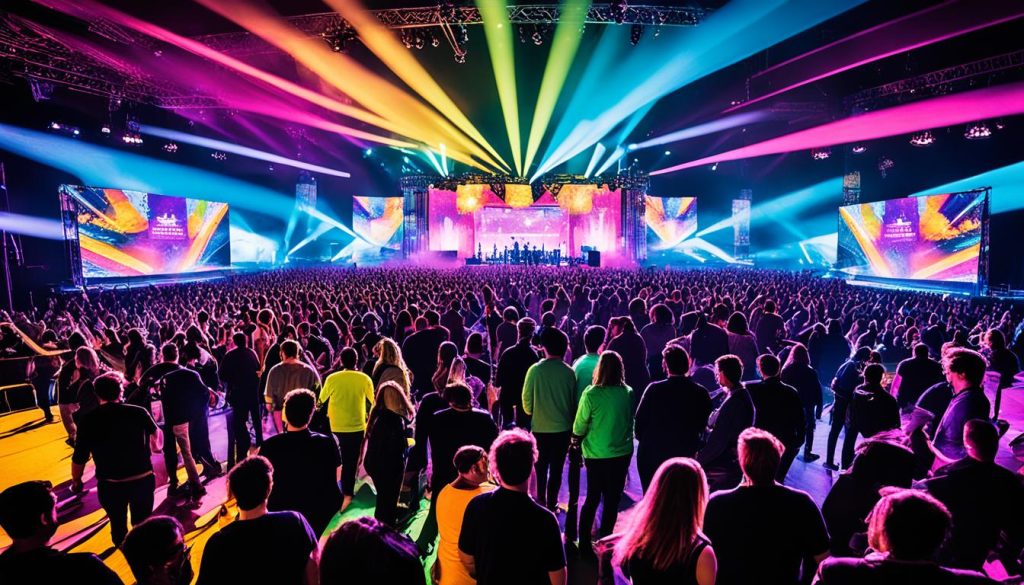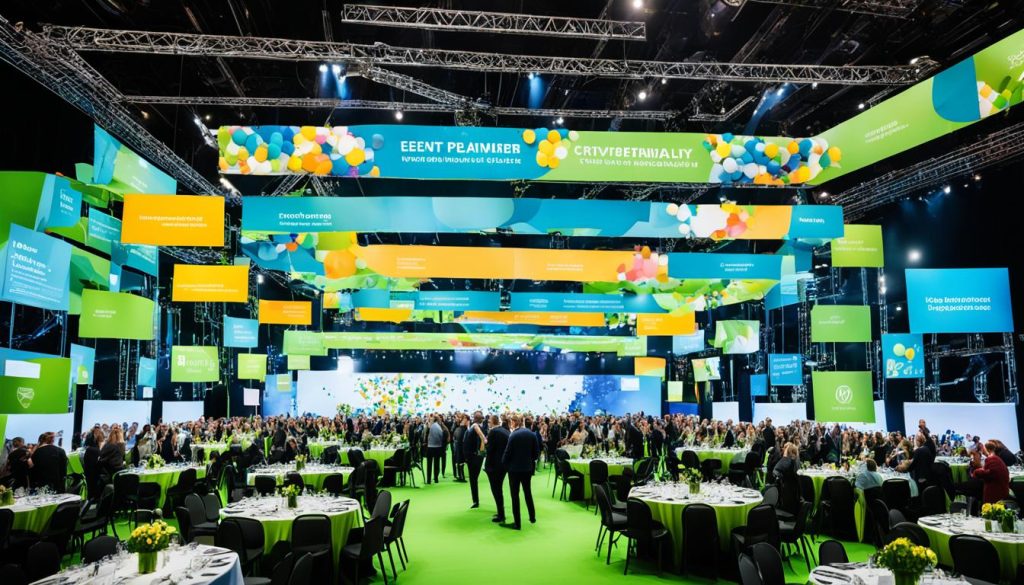The event management industry in the UK is key to economic growth and cultural life. It brings together different groups through various events, from corporate gatherings to public festivals. With new tech and a push for sustainability, the industry is changing fast.
It meets the needs of today’s event trends and what people expect. The UK Events Industry Board says it’s a big part of the economy, helping with jobs and GDP.
Key Takeaways
- The UK event management industry is crucial for economic growth and cultural representation.
- Event trends are increasingly focused on sustainability and technology integration.
- Corporate, public, and non-profit organisations all benefit from effective event planning.
- Data from reliable sources highlight the industry’s impact on GDP and employment.
- Adaptability and innovation are essential for success in the evolving market.
Overview of the Event Management Industry in the UK
The UK event management industry is key to the country’s economy, boosting the event planning sector’s growth. It covers a wide range of events, from corporate meetings to social gatherings. Each event type needs its own strategy and skills, showing the industry’s dynamic nature.
Event professionals work closely with many people, including planners, coordinators, and marketers. They also work with venues, suppliers, and sponsors. These partnerships lead to new ideas and better efficiency, helping the UK event industry grow.
Recent figures show how the industry adapts to new market needs. As what people want changes, the event planning sector must too. It’s embracing new trends like immersive experiences and digital tools. This shows the UK event management industry’s strength and creativity.
Current Trends Shaping the Event Management Sector
The UK’s event management sector is changing fast, thanks to new trends. Digital and hybrid events are becoming more popular. This change means events can reach more people and be more accessible.
Now, making the event experience better for attendees is key. Managers focus on making each person feel special. This approach matches the industry’s focus on improving how events engage with people.
Data analytics is now vital for event success. It helps planners understand what people like and make better choices. This leads to happier attendees and shows the power of innovation in events.
Events are also getting greener, thanks to a focus on sustainability. Going green meets what people expect and fits with today’s values. It makes events more attractive to everyone.
Key Challenges Faced by Event Managers
The world of event management is always changing, bringing new challenges. One big issue is managing budgets. Event planners often find it hard to meet client needs with limited money. They must pick what’s most important and try to save money.
Dealing with logistics is another big challenge. It involves working with many vendors, venues, and timelines. If there’s a mistake, it can cause big problems, harm the event, and upset clients. These issues are major hurdles for event professionals.
What clients want is always changing too. They want new ideas and special experiences. Event managers must keep up with trends and change their plans often. The competition makes it harder to stand out.
Events like the COVID-19 pandemic have brought new problems. Event managers now need to plan flexibly and manage risks well. Being able to adapt is key to overcoming event management challenges.
Importance of Sustainability in Event Management
In today’s event management world, sustainability is key. It shows a deep care for the planet. Event planners are now choosing eco-friendly ways to make events better for the environment. This also wins over people who like sustainable actions.
Eco-Friendly Practices in Events
Using eco-friendly practices is crucial for sustainable events. Important steps include:
- Reducing waste with digital tickets and recyclable stuff.
- Choosing local materials to cut down on transport emissions and help local businesses.
- Using green energy to power events, cutting down on fossil fuel use.
These steps are now common for companies wanting to look good and help the planet.
Impact of Sustainability on Attendee Engagement
When events focus on being green, they draw in more people. People like to go to events that care for the earth. Adding educational bits about being green makes the event more memorable and connects people with the event’s message.
As more people worry about the environment, there will be more calls for green events. This means event planners must keep finding new ways to be sustainable. It’s a key part of planning successful events.
Technological Innovations Transforming Events
Event management is changing fast thanks to new tech. These changes are making events better for everyone and easier to plan. Virtual events are getting more popular, and we’re looking at how tech is helping with these and other event types.
Virtual and Hybrid Events
Virtual events let people from all over the world join in. They use the latest tech to make sure everyone feels part of the action. This includes:
- High-definition streaming platforms for smooth connections
- Interactive features like Q&A sessions and polls
- Virtual reality elements for a deep dive into the event
Hybrid events mix in-person and online parts. They offer something for everyone. This way, they use new tech to keep everyone, whether they’re there in person or not, fully involved.
Event Management Software Solutions
Software for managing events is key to making things run smoothly. These tools help with planning, like:
- Budgeting and tracking money
- Handling registrations and tickets
- Real-time data to see how engaged attendees are
Using these technologies, planners can focus on being creative and strategic. They know the tech side is taken care of. This shows how event tech is changing the way we manage events, making them more successful.
Regulatory Considerations in the UK Event Management Industry
The UK event management industry follows strict rules to keep events safe and legal. These rules cover health and safety, licensing, and legal duties. Event managers must understand these UK regulations event management to avoid legal problems.
Health and safety are top priorities for keeping everyone safe. Event safety standards outline what organisers must do, like managing crowds and planning for emergencies. Managers must also check for risks and find ways to reduce them.
Events need different licences, depending on what they offer. This includes permits for loud music, selling alcohol, and certain activities. Making sure events follow these rules is key to success.
Having the right insurance is also crucial. It protects both the event team and guests from unexpected costs. This builds trust with everyone involved.
Following event safety standards is essential for a successful event. Keeping up with new rules and best practices helps event managers deal with challenges in the industry.
Market Segmentation in the Event Management Industry
The UK event management industry is varied, covering many segments for different audience needs. It’s about grouping events into types that show their unique traits, challenges, and goals. This helps us understand corporate and public events better. These are big parts of the market.
Corporate Events
Corporate events stand out because of their special features. They include things like conferences, product launches, seminars, and retreats for companies. Each event has its own goals, like sharing knowledge, networking, and promoting brands. Here are some key things to know about corporate events:
- Objectives: These events aim to meet business goals, boost brand awareness, and build client relationships.
- Target Audience: They’re mainly for employees, stakeholders, clients, and experts in the field.
- Budget Considerations: Corporate events usually have a big budget. This shows how much they value professional quality and results.
Public Events and Festivals
Public events and festivals, on the other hand, reach out to a wider audience. They bring people together, celebrate culture, and build community spirit. Examples include music festivals, fairs, exhibitions, and charity events. Here are some key points about public events:
- Accessibility: These events are made for lots of people to join in. They aim to be inclusive and involve the community.
- Entertainment Value: They focus on giving people fun and memorable experiences.
- Sponsorship and Partnerships: Public events often get support from sponsors. This helps with community ties and financial backing.
Networking Opportunities in the Event Management Field
Networking is key in event management for career and business growth. It helps professionals meet peers, share ideas, and learn from leaders. Industry events offer chances to make valuable connections and work together.
Here are some top places for networking in event management:
- Industry Associations: Groups like the Event Industry Forum and the International Live Events Association host events for networking.
- Trade Shows: Big events like The Event Show and International Confex bring together many people, making it great for making connections.
- Online Forums and Social Media Groups: Sites like LinkedIn and specific online communities are perfect for networking all year round.
Being active in these networking chances boosts your industry knowledge. It also helps find business partners and collaborations. Networking is vital in event management. It helps with ongoing professional growth and success.
Professional Development for Event Managers
For event managers, continuous learning is key to success. Taking part in training for event professionals boosts skills and knowledge. This helps them keep up with changes in the industry. There are many courses and certifications available, covering topics like managing projects, assessing risks, and digital marketing.
Joining professional groups gives event managers a chance to network, access resources, and find mentors. These groups help with career growth in event management. They connect people with experts who share advice and insights.
Online tools have changed how event managers learn. Webinars, e-learning, and workshops are easy to fit into a busy schedule. They keep professionals informed about new trends. This supports a culture of excellence among professional development event managers.
Impact of COVID-19 on the Event Management Industry
The COVID-19 pandemic has changed the event management world. It made planners rethink old ways. Now, they must plan events differently, using new strategies.
They also need to follow strict health rules to keep everyone safe.
Adapting to New Health Regulations
As events start to come back, health and safety are key. This means using contactless systems, keeping places clean, and telling people how to stay safe. These steps help meet new safety standards and make guests feel secure.
Experts say it’s crucial to stay alert and change plans as health advice changes. Being flexible is key to doing well after the pandemic.
Success Stories and Case Studies
Many event management case studies have shown new ideas in different sectors. These examples are not just about the best practices. They also inspire others for future events. Learning from these successes can greatly help the industry.
Innovative Event Concepts
Recent years have seen some unique event strategies. The London 2012 Olympics used new tech and sustainable practices. It set a high standard for event planning. Millions watched, showing how creativity can make events successful.
The Royal Wedding used immersive experiences to grab global attention. It showed how storytelling can improve engagement and satisfaction.
Lessons Learned from Major Events
Big events teach us a lot. The 2012 Olympics taught us about planning for the unexpected and good communication. These lessons can help make future events successful.
Details like security, guest experience, and brand alignment are key to success. Looking at past successes helps planners make better choices. This leads to events that are memorable and impactful.
Future Outlook for the UK Event Management Industry
The UK event industry is set for a bright future, with new trends leading the way. Technology and sustainability are big influences, making event planning more exciting. Hybrid events, blending real and online experiences, will soon be common. This change will help events reach more people than ever before.
There’s a big push for eco-friendly events too. With new rules and more people caring about the planet, events will get greener. This not only helps the environment but also attracts people who value such efforts.
But, there are hurdles ahead. Event managers need to be quick and innovative to keep up. By following new trends and using the latest tech, they can stay ahead. The UK event industry’s future looks promising for those who are ready to adapt and take on new challenges.




















